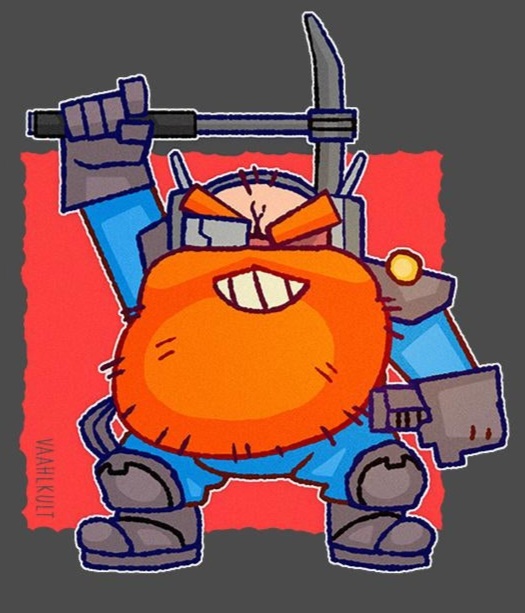My takeaway is that it’s only original Rogue fans that care about the delineation of the terms. Is there a modern (i.e. post 2000s game) that matches the definition of a roguelike as given in the article?
Roguelikes come from the age of boomers and gen x, are hard as nails, very complex, have a cursed tome of documentation and take months to reach victory, if at all.
Roguelites are for the modern times.
@Risk It’s a contentious topic. My roguelike podcast cohosts and I devoted almost 2 hours talking about this specifically in a recent episode: https://grogpod.zone/2023-10-11-what-is-a-roguelike/
It’s also worth noting that the definitions have changed over time and will likely continue to do so, as with any evolving genre: https://github.com/ScottBurger/going_rogue_podcast/wiki/What-is-a-roguelike-database
This article doesn’t interpret the Berlin interpretation correctly. The things the article says are “must haves” are actually just “high value factors” as the post says.
This list can be used to determine how roguelike a game is. Missing some points does not mean the game is not a roguelike. Likewise, possessing some points does not mean the game is a roguelike.
So while some of these are deemed important to roguelike, it can be a roguelike without all of those things.
Now personally I think the debate over the genre is silly, and I don’t think the Berlin interpretation is really accurate anymore. But to be fair to it, it does not say a game has to have everything on that list. Spelunky is a roguelike. Idc what anyone says. Just because it isn’t turn/grid based doesn’t mean it isn’t a roguelike. It has most all the other high value factors, and a handful of the low value factors as well.
Sorry, but the people using the original definition are definitely the minority now. It’s just how language evolves, niche terms that get popular get generalized. Developers aren’t misusing the term because original rogue likes are just that popular, they’re misusing the term because the vast majority of their audience misuse the term and couldn’t give less of a shit about the original definition.
I always thought rogue-like games were just stealthy sneak games.
Spelunky lacked the spirit of a roguelike? Yeah that’s bullshit. It is the perfect spiritual successor and evolution to classic roguelike games.
It turns out that the genre is defined by permadeath and random generation, that’s about it. Everything else is merely nostalgia.
They both have random generation of runs, doesn’t even have to be a dungeon crawler. The only difference is that a roguelite has meta-progression: you in some manner earn resources from each run that allow you to gain advantages on future runs
But does it have to be resources? What about unlocking a new character type, that can use different powers?
New characters are resources too. The word doesn’t have to be limited to spendable currencies like “lumber and gems”.
Is there a modern (i.e. post 2000s game) that matches the definition of a roguelike as given in the article?
I think Caves Of Qud qualifies. But “real” roguelikes are few and far between these days, so it’s no surprise to me that the term has expanded to cover more. Otherwise it would’ve become essentially obsolete.
Caves of Qud, Ancient Domains of Mystery, Tales of Maj’Eyal, Cataclysm: Dark Days Ahead, and Dwarf Fortress Adventure Mode are all examples of modern games that meet the definition of a “traditional roguelike” - which is the term Steam uses to categorise games that are actually like Rogue, as opposed to games that just have permadeath and procgen.
However, dorks like the guy who wrote this article need to understand that language evolves. Roguelike doesn’t mean the same thing today as it did 30 years ago. There’s no problem whatsoever with games like Slay the Spire, Dead Souls and FTL being called roguelikes - you can see in an instant that these games don’t meet the definition of the traditional roguelike. The claim that this terminology is confusing or frustrating is just not true.
However, dorks like the guy who wrote this article need to understand that language evolves.
When they tried to call things “Rogue-like-like” is where they lost me.
Dead Cells, as far as I recall. What a f****** awesome game.
Oh, and Hades, except that had a lot of dialogue, which this is saying true roguelikes don’t have. But f*** off, Hades is one of the best games in years.
Definitely Dead Cells covers all of those bullet points in the definition though, and I played that for about as long as I played Hades, 120 plus hours or so.
Hades would be considered Roguelite, doesnt mean its a bad game, its great.
Off the top of my head, pixel dungeon, golden krone hotel, caves of qud, cogmind, zorbus & tangledeep all fit the strictest definition IMO. Probably Jupiter hell and maybe spelunky too
For me at least, the definitions are:
A roguelite is a permadeath, generally procedurally generated game, generally with a metagame over the runs
A roguelike is that, but in addition it’s also a turn based dungeon crawler RPG. I’d say the metagame is a less common aspect with traditional roguelikes
I’ve heard that roguelites have progression between runs, which makes successive runs easier, while roguelikes usually don’t?
That’s the definition I’ve always heard too.
I think the confusion happens because like and lite sound similar. In another language I don’t think this would be a common confusion at all.
That’s what I’m referring to with the metagame parts, though you might be correct in that no true roguelike has this metagame aspect.
Don´t get me wrong, I don´t mean to gatekeep (I in fact play lites, not likes). However, a useful orientation when you want to know if a game is a like or not, is in my opinion the Berlin Interpretation
Yep, that’s the only answer that makes sense to anybody who actually plays and likes roguelikes.
As a rule of thumb I like say that if it needs a pause button it’s a 'lite. This doesn’t come close to covering the criteria but it’s a good shortcut to weed out a lot of them.
It’s fine if a game is categorised more specifically, the problem is people getting upset that something is a Roguelite and not a Roguelike.
It doesn’t matter, no genre is better than the other, your game isn’t by default worse because it’s a Roguelite and isn’t by default better because it’s a Roguelike, it’s just a genre definition to help people find similar games.I get that some might think they are too similar, but in that case we should just keep Roguelike and then define Roguelite games in a different way. At the moment a problem is games that have the ‘run’ gameplay, but nothing else like Rogue and then call themselves Roguelikes, but that’s like having a bonfire checkpoint system in a visual novel and calling it Soulslike.
As someone who is VERY aware of the over-specificitty of The Berlin Interpretation:
Generally speaking, nobody is saying a roguelike is worse. Just like DOOM is not worse than Operation Flashpoint because it is not a milsim. It just has to do with having criteria to indicate what games people might like if they liked others. And while there are a lot of borderline cases*, generally speaking, roguelikes and roguelites are very much built differently. Roguelites are very much built around “failure is progress” in the sense that, quite often, you actually need to fail a few times to unlock the endgame.
So when people are saying a game is “the wrong genre”… it can get annoying. It isn’t saying that Hades is worse than Stoneshard** but more that they are very different kinds of games.
*: For example, Tales of Maj’Eyal is NOT a roguelike. Maybe you don’t care about the aesthetics (I sure don’t) but stuff like the transmog bag and the unlockable classes and “races” very much disqualify it. But there is a reason it is one of the most loved games among the “roguelike” crowd. It is one of the best modernizations of the formula to ever be made.
**: Which also would not qualify. Which is stupid
Mmm yeah, The Berlin Interpretation is way too specific, things like the graphics/grid etc. If some game fits more than half the factors, perhaps that should be considered ‘like’ enough? But I do understand why people can get anal about some games being categorised as Roguelike when they are infact not very similar at all.
I think it boils down to genre being misused in general, there’s games with large open spaces called Open World, when they are not really, games that are called MMO when they are not. RPG games that are not actually RPG etc etc etc. Rogue fans just made a bigger deal out of it.
Well, a lot of that boils down to actually “putting in the effort” to have sane-ish distinctions (the bar is low). You’ll see similar arguments from the milsim crowd, for example. Same with a lot of flight sims where there are generally pretty well understood criteria for the different subtypes (even if it is a mess to find a way to refer to stuff like “Lock-On” that is not “arcadey”…). This isn’t “Well, it has a level up animation so I guess it is an RPG”. This is “It meets criteria X, Y, and Z so it is a roguelike. It meets only x and y, so it is a roguelike. Why do you keep bringing up Operation Flashpoint?”
Contrast that with something like FPSes where you can vaguely distinguish the different eras but there is a lot more bleedover to the point of (fucking stupid and borderline offensive name aside…) not actually being sure if DOOM 2016 is a “boomer shooter” because of the design decisions… even though DOOM is the gold standard for both 2016 and stuff like Dusk (actually Quake was, but DOOM markets better).
Like, I assume most of the crowd are too young to remember but there were actually REALLY big arguments over “MMO” back in the day. Maybe we all remember the question of “So… is Destiny an MMO?”. But there were a LOT of arguments over Guild Wars 1. Because it looked like an MMO and it even progressed like an MMO but… it was Diablo 2 with a fancy skin for the IRC chat room between instances. And a lot of people (kind of rightfully…) blame Guild Wars 1 for the mess that has resulted in “Diablo 4 is my favorite MMO”.
Which, getting back to Roguelikes/lites… as long as you listen to WHY something is not a roguelike, it is a really good distinction. If the reason involves progression mechanics then you almost immediately know if you care. And if it becomes one about aesthetics, you know nobody, not even the person bringing it up, really cares.
Why isn’t there just a genre name for both? Painfully uninspired to just tack “like” to any game and dust your hands off for a job well done.
Well, these genre names are rarely chosen intelligently. People were initially just saying that certain games are like Rogue, and that eventually just started to include more and more. In recent history, we’ve also had “Souls-likes” which started out similarly innocent.
I mean, sometimes there’s a relatively intuitive name that people standardize on, like “Jump’n’Run”, but that wasn’t really possible with Roguelikes, as people hardly knew which parts of the Rogue formula were genre-defining.
Well, and it’s also just a rather abstract genre. Even retrospectively, we could only really call it “Permadeath’n’ProceduralMapGeneration”.
Idk kinda works ngl
/s
Likes are a pretty strictly defined genre. Lites on the other hand can be almost any genre. You could categorize both as “Run based games” but that leaves you with a very vague definition that says almost nothing about a game except that it´s … run based.
There basically is. “Run based games”. Stuff like FTL also fall into that category.
But also? Just because you like Stoneshard doesn’t mean you like Shortest Trip to Earth. Just like how “action games” covers pretty FPS and TPS and Platformers. Or how “FPS” covers arena shooters, Call of Duty, and milsims.
Rogueli*es
The conversation around the two really wears me out. IMO, there’s no need to be so restrictive. We can call them traditional roguelikes, platform roguelikes, whatever, and I think that’s fine. If anything, I think we should have better terminology to differentiate games where the runs are isolated and those where there is meta progression. I don’t think roguelite a good name for the latter.
The conversation around the two really wears me out.
Sorry! I came across a game and realised that there were two distinct terms that I had heard/seen over the years, and so I wondered what the difference was. Never come across discourse over it before, so that’s why I posted.
Nothing against you specifically! It would be more accurate to say that the people who will die on the hill of roguelike being something very specific wear me out.
Sure, that’s fine if people were actually specifying any sort of modifier. But calling everything a roguelike makes it hard to find the traditional roguelikes for those that like them. I’d be ok if the terms were standardized with modifiers like “Traditional Roguelike”, etc, but they aren’t. Everything with permadeath gets the label roguelike these days.
We can also just call them all rogue-likes. Everyone intuitively understands there’s a huge space in that by now, and the games can wildly differ. It’s fine. We know that no two MMORPGs are alike, and now two rogue-likes are alike.









